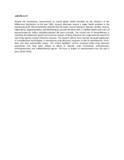| dc.description.abstract | Despite the tremendous improvement in overall global health heralded by the adoption of the Millennium Declaration in the year 2000, tropical infections remain a major health problem in the developing world. Recent estimates indicate that the major tropical infectious diseases, namely, malaria, tuberculosis, trypanosomiasis, and leishmaniasis, account for more than 2.2 million deaths and a loss of approximately 85 million disability-adjusted life years annually. The crucial role of chemotherapy in curtailing the deleterious health and economic impacts of these infections has invigorated the search for new drugs against tropical infectious diseases. The research efforts have involved increased application of computational technologies in mainstream drug discovery programs at the hit identification, hit-to-lead, and lead optimization stages. This review highlights various computer-aided drug discovery approaches that have been utilized in efforts to identify novel antimalarial, antitubercular, antitrypanosomal, and antileishmanial agents. The focus is largely on developments over the past 5 years (2010–2014). | en_US |

